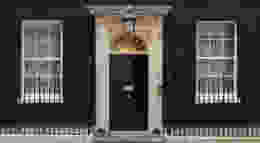
The ‘West–East’ Irish Sea border: dividing our country again
Since 2021 we have been told that, while the Irish Sea Border fetters the flow of goods from Great Britain to Northern Ireland, goods can move freely the other way, from Northern Ireland to Great Britain.
That was always a nonsense because if the customs and phytosanitary (SPS) border was not located on the international land border between the UK and Republic of Ireland, there would have to be Irish Sea border checks on movements from NI to GB to identify and process goods coming from the Republic.
Today, more than four years after the supposed arrival of the border, we will begin to see its enforcement on goods moving from Northern Ireland to Great Britain. In coming to terms with this sad date in the division of our country, two points should be understood.
In the first instance, and contrary to what is widely believed, under the mis-named Windsor Framework (UK Internal Market and Unfettered Access) Regulations 2024, export procedures will actually be applied to Northern Ireland goods moving to GB in five different areas for the first time. The Government has said the application of these export procedures will have minimal effect but since they told me that about the impact of the EU General Product Safety Regulations, I am not going to hold my breath!
But there is a much bigger issue here. Even if the imposition of export procedures in these areas does not cause great disruption, it still amounts to cementing in the Irish Sea border and the division of our country. If you move goods in the five areas from England to Wales or Scotland to England, you don’t need to submit to export procedures, any more than you would have had to in moving the same goods from NI to GB before the Irish Sea border.

This is wrong!
In the second instance, under the arrangements coming into force today, lorries from the Republic of Ireland, and those from Northern Ireland carrying any ‘Non-NI Qualifying Goods’, or goods in the five areas subject to export procedures, will submit customs and SPS forms electronically before departure. They will then be told whether or not they need to submit to checks, which can be
carried out away from the border at inland border control posts and even at their destination.
This is a hugely important development because in removing the need for a ‘hard border’ these arrangements remove the justification for the Irish Sea border which was only imposed because we were told there could not be a hard border on the actual international border between the Republic and Northern Ireland. The revelation that it was not necessary to have a hard border across the island of Ireland in the first place, is a game changer.
Going forward the UK Government has to explain why, knowing: i) that the proposed NI to GB border arrangements are workable, and ii) that the proportion of goods entering the Republic from Northern Ireland in 2020 was tiny (only worth 0.003% of EU GDP in 2020), they still agree with a border ‘solution’ that is giving the EU the right to disrespect the territorial integrity of the UK, (replacing the UK single market for goods with a GB single market for goods and an all-Ireland single market for goods run by the EU), and disenfranchise the people of Northern Ireland in a staggering 300 areas of law! This is not only absurdly disproportionate but also deeply dishonourable, sacrificing key aspects of the citizenship of its own people.
What is more, the act of running a border, while removing hard infrastructure from that border, is a key part of Mutual Enforcement, the solution proposed by my EU Withdrawal (Arrangements) Bill currently before Parliament. The Government should abandon introducing the next part of the Irish Sea border, the Parcels Border, on 31 March, and work to replace the Irish Sea border with Mutual Enforcement in relation to the actual border. Far from being unthinkable, Mutual Enforcement was first set out within the EU by Sir Jonathan Faull, the then EU Commission Director General of their Brexit Task Force, together with Profs JH Weiler and Daniel Sarmiento. It is the only morally acceptable solution because it both avoids a hard border across the island of Ireland and does not disenfranchise anyone or disrespect the territorial integrity of the UK.

Jim Allister is the Traditional Unionist Voice MP for North Antrim.













